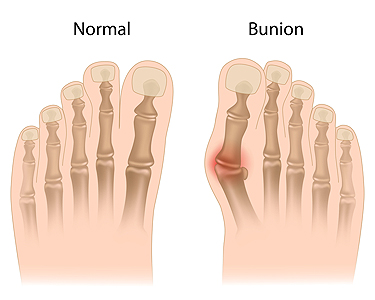
A bunion, a bony protrusion at the base of the big toe, results from bone, tendon, and tissue misalignment. This condition causes the big toe to angle towards the smaller toes. Non-surgical treatments aim to manage pain, reduce swelling, and slow bunion progression. Appropriate footwear plays a vital role, and choosing spacious, bunion-friendly shoes that allow toe room is essential, while avoiding pointed or tight shoes is advisable. Wearing orthotics can improve comfort, arch support, and weight distribution. Additionally, splints and toe spacers can help maintain toe alignment and alleviate pressure on the toes. Engaging in specific exercises can enhance flexibility, relieve pain, and strengthen foot muscles. Although these methods can alleviate symptoms and slow bunion progression, they do not correct the underlying bone misalignment. Surgery may become necessary for severe pain or when conservative treatments prove ineffective. If you have a bunion that is causing discomfort, it is suggested that you schedule an appointment with a podiatrist for pain-relieving treatment.
If you are suffering from bunions, contact one of our podiatrists of New Jersey. our doctors can provide the care you need to keep you pain-free and on your feet.
What Is a Bunion?
A bunion is formed of swollen tissue or an enlargement of boney growth, usually located at the base joint of the toe that connects to the foot. The swelling occurs due to the bones in the big toe shifting inward, which impacts the other toes of the foot. This causes the area around the base of the big toe to become inflamed and painful.
Why Do Bunions Form?
Genetics – Susceptibility to bunions are often hereditary
Stress on the feet – Poorly fitted and uncomfortable footwear that places stress on feet, such as heels, can worsen existing bunions
How Are Bunions Diagnosed?
Doctors often perform two tests – blood tests and x-rays – when trying to diagnose bunions, especially in the early stages of development. Blood tests help determine if the foot pain is being caused by something else, such as arthritis, while x-rays provide a clear picture of your bone structure to your doctor.
How Are Bunions Treated?
- Refrain from wearing heels or similar shoes that cause discomfort
- Select wider shoes that can provide more comfort and reduce pain
- Anti-inflammatory and pain management drugs
- Orthotics or foot inserts
- Surgery
If you have any questions, please feel free to contact our office located in Neptune City, NJ . We offer the newest diagnostic and treatment technologies for all your foot care needs.
